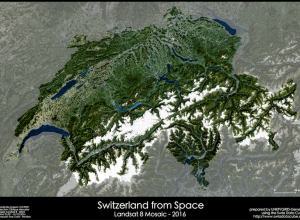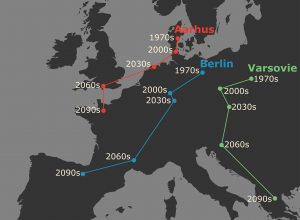Interdisciplinary Science for Water
We live on a beautiful “Blue Planet”, where water, climate and life cannot exist without one other. Water is present in gaseous, liquid and solid forms, which control the planet’s climate. Water vapor is a greenhouse gas, while snow and ice reflect solar radiation. Liquid water is what made the development of life on earth possible. Covering about 71 percent of the Earth's surface, the oceans regulate the climate and environmental systems. Life on the Earth is unimaginable without water; it directly and indirectly sustains all of us. Water continuously cycles through ecosystems and redistributes itself through precipitation, infiltration, transpiration, runoff and subsurface flow. Freshwater constitutes only 2.5% of the total water volume of the planet and most of it is “locked” in glaciers and ice caps. Only 0.01% of the freshwater is found in lakes, ponds and marshes, rivers and streams – the vital sources for all living organisms, human health, food production and economic development. Man has well adapted, managed and used the water cycle. Hence, freshwater use became a symbol of the rise, power and decline of civilizations.
We live on a “Thirsty Planet”, where around 1.9 billion people live in water-scarce areas, where 1.8 billion people drink water from sources affected by foecal contamination, and where 1.2 billion people are at risk from floods . The global and local drivers of water vulernability, such as rapid technological development, population growth, urbanization, land use, pollution and climate change, induce unprecedented pressure on the aquatic environment, threaten their integrity, and jeopardize their key socioeconomic services. Hence, freshwater is becoming an extremely critical natural resource for human well-being nowadays. The potential consequences for water availability, in terms of quantity and quality, biodiversity and risk for the environment and human health have become main issues of public concern and one of the obstacles towards the sustainable development.
In recognition of the vital importance of water, March 22nd was designated International World Water Day by the United Nations General Assembly in 1993. Since then, every year the 22nd of March brings to the attention of the people around the world various water-related issues, covering broad range of topics from Clean Water for a Healthy World and Sustainable Development to Water and Culture.
The 2018 topic for International World Water Day is Nature for Water and brings to the attention how the innovative and cost-effective nature-based solutions can contribute to overwhelm the water challenges of the 21st century.
We live on a “Green Planet” too, where developing nature-inspired solutions require a comprehensive understanding of the complex processes inherent to the Earth functioning and coupling the hydrosphere, atmosphere, biosphere and lithosphere. At the forefront of the water science, the multi-disciplinary research teams of the Institute for environmental science and the Department F.-A. Forel for environmental and aquatic sciences work together to uncover the complex interactions in aquatic ecosystems and the feedback loops between various climatic and anthropogenic stressors, that influence water availability and quality.
Bringing together knowledge in physics, chemistry, biology and geology of aquatic ecosystems at various spatial and temporal scales allows us to tackle water challenges of the 21st century. We believe that such multi- and interdisciplinary approach can result in development of innovative concepts and “green” solutions to enhance water availability, improve water quality and reduce risks associated with water-related disasters, climate change and chemical pollution - key targets in sustainable development goals.
Considering the inseparable relationship between water, climate and nature necessitates integrating them through management and governance. This requires rethinking the boundaries between water policies and other environmental policies, and implementing forms of governance that combine and bridge those policies. The nexus concept, which suggests better understanding the relationship, trade-offs and synergies between policies such as water, biodiversity, food and energy, could be a useful way forward. However, the implementation of such a concept in the daily making of water policies still represents a major challenge for our public authorities. Hence, governance analysis is key to proposing new kind of governance arrangements taking into account the transversality of water and ecological problems and solutions.
This also requires identifying and discussing the economic, social and cultural values of nature in relation to common goals such as water quality improvement, disaster risk reduction and freshwater provision.. The many ecosystem services provided by water a critical, but there are still few examples of policy design that takes these fulliy into account. Researchers at our institute works on these, among other, challenges. It requires developing and proposing an extended toolbox for policy makers at different scales.
Finally, the increasing vulnerability of water supplies, both in terms of water scarcity and water quality, could increase potential rivalries between uses and generate water conflicts. In a context of water-scarce cities, countries and regions, we need to revise water allocation policies and strategies to prevent conflicts and a blue-gold rush. We also need options to promote cooperation towards secure and more access and sustainable access to water resources., while minimizing the risk of overexploitation of the resource base. This is one of the key research topic of the UNESCO Chair in Hydropolitics and the Geneva Water Hub, located at the Institute for Environmental Science.
The challenges faced by water as a natural resource and for the governance of this key resource thus call for major efforts in interdisciplinary research in order to propose innovative concepts, to promote new methods and tools for an evidence-based decision making processes.
Géraldine Pflieger
Prof. Géraldine Pflieger is the Director of the Institute for Environmental Sciences (ISE) at the University of Geneva, where she also is a Professor of urban and environmental studies. Her current research focuses on the regulation of shared natural resources (mainly water and land) – at the international, regional and local scales – as well as the transformation of the governance of urban spaces in the face of the major contemporary infrastructural and environmental challenges (for example the links between transport and land-use or between urbanization and resource consumption). Together with Professor Christian Bréthaut, she holds the UNESCO Chair in Hydropolitics at UNIGE.
Vera Slaveykova
Prof. Vera Slaveykova is an environmental chemist with more than 25 years of experience and a full professor in Environmental Biogeochemistry and Ecotoxicology at the Department F.-A. Forel for Environmental and Aquatic Sciences and the Institute for Environmental Sciences at the University of Geneva. Over the past 12 years, she has served as the Director of the Department F.-A. Forel for Environmental and Aquatic Sciences, Vice-President, and President of the School of Earth and Environmental Sciences at the University of Geneva. Currently, she is a member of the National Research Council of the Swiss National Science Foundation and represents the University of Geneva in the UNEP Global Mercury Partnership. She also serves as Specialty Chief Editor for Biogeochemical Dynamics in Frontiers in Environmental Science.




